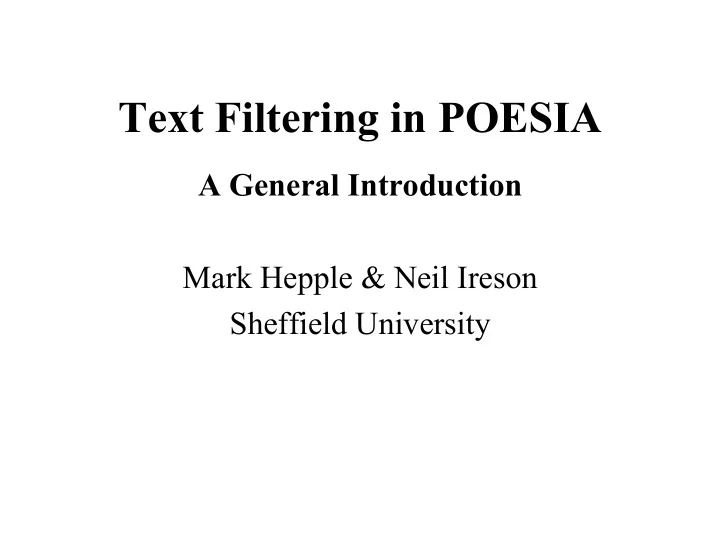

Text Filtering in POESIA A General Introduction Mark Hepple & Neil Ireson Sheffield University
Internet Pornography (2003) Volume of material is immense: • 4.2 million websites (12%) • 372 million pages • 68 million search engine requests/day (25%) • 1.5 billion downloads/month (35%)
Pornographers Tricks • Cyber-squatting : buy legitimate sounding domain names for porn sites – whitehouse.com (c.f. whitehouse.org), civilwarbattles.com, tourdefrance.com • Mis-spelling : buy domain names that are mis-spellings of important sites for porn e.g. googlle.com
Pornographers Tricks (cont) • Doorway scams : non-porn pages designed for indexing by search engines – user accessing page is redirected to porn site • Porn-napping : buy lapsed domains for porn sites (sell back to ex-owner for large fee) e.g. moneyopolis.org: money management site for kids by Ernst & Young
Current Filtering Systems • Blacklists – addresses of ‘unacceptable’ sites • Keywords – block pages containing certain words/phrases BUT … • many words ambiguous, meaning depends on context – inclusion (resp. exclusion) of these terms as keywords results in over (resp. under) blocking – much offensive content in image form • need for effective filtering based on content
Text filtering in POESIA • POESIA: multiple filters, including filters for image & textual content • Textual content filters use NLP methods to enhance recognition of categorisation relevant uses of terms • Textual content filters are language specific for English, Italian, Spanish (+ limited for French) • Approach requires a language identification component
Language Identifier • Models probability distribution of 3- character n-grams – Parallel language text • 11 European languages (~560 Mbytes total) – Smoothing: Good-Turing Estimation – Term (Feature) selection: Information-Gain – Similarity metric: Entropy measure
Language Identifier Evaluation • Non-porn pages = ~3% error • Porn pages = ~2% error • Pages with low amount of text – n-grams <30 (3.5% of pages): ~45% error – 30< n-grams <100 (6.5% of pages): ~12% error – 200< n-grams (80% of pages) ~0% error • Problems – Imperfect & impure language use – Specific terminology • Domain specific identifier – Proper names
Language Specific Text Filters • NLP based filtering quite computationally expensive, useful to provide both two filtering modes: – Light: gives fast accept/reject for simple cases – Heavy: applies more complex methods for difficult cases, i.e. cases not resolved by light filtering • Light Filters – Statistical “bag-of-word” models – Stemming, term-selection, term-weighting… • Heavy Filters – NLP Techniques – Machine Learning Techniques – Localised context
Data Collection for Text Filtering • Both porn/non-porn data collected automatically by spidering from the Google directory • Approach has advantages/disadvantages – Pros: • large dynamic sample of web • 72 specific language categories – Cons: • biased sample • misclassified pages
Recommend
More recommend